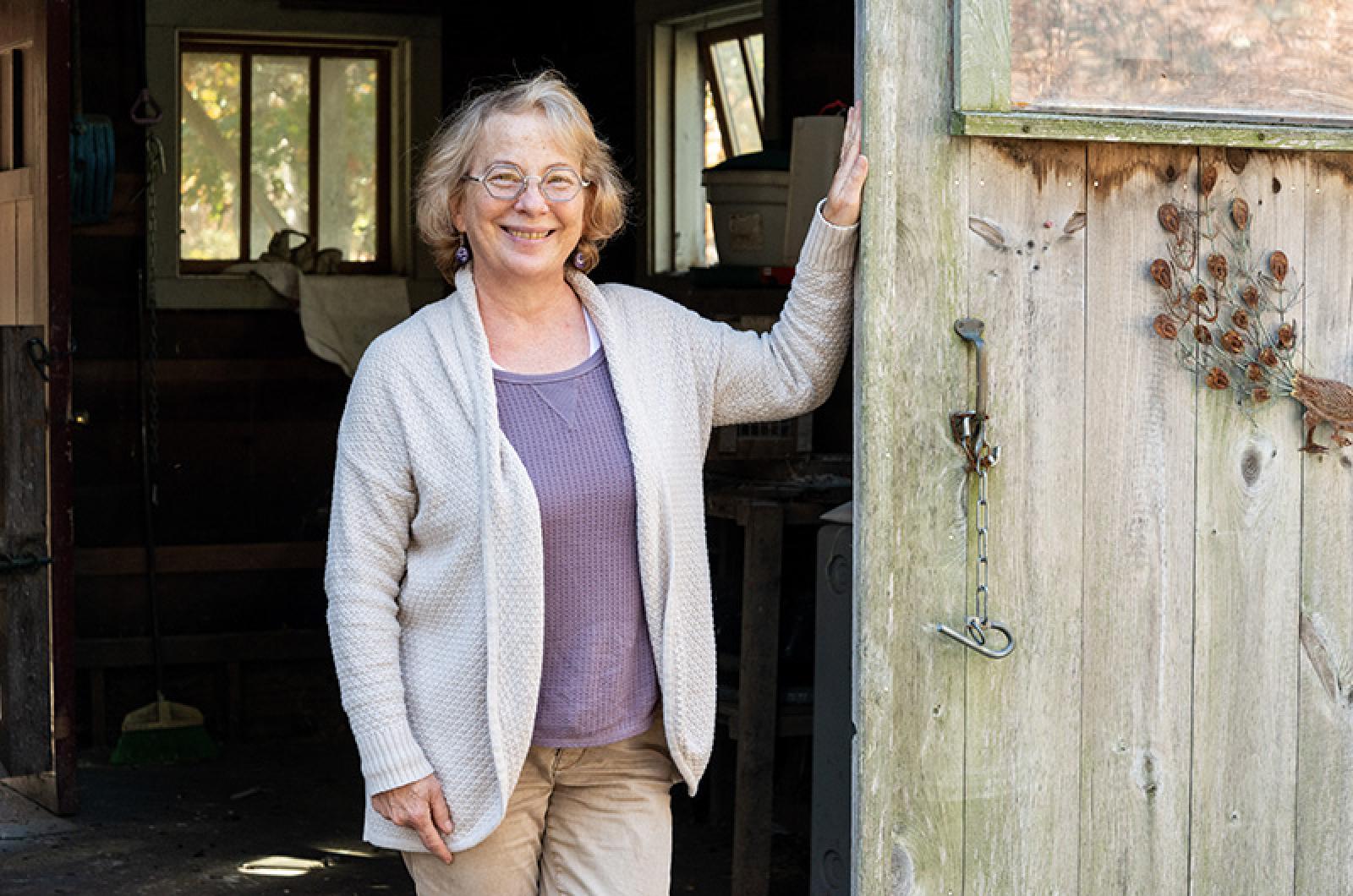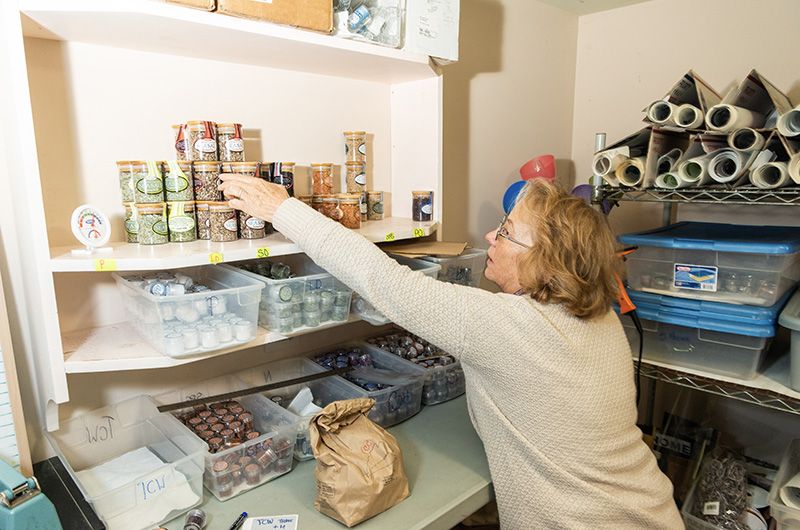On Jan. 1, 2022, Heidi Feldman will wake up for the first time in nine years with only one job instead of two. She’ll at last be doing what every small business owner dreams of — working solely for the enterprise she and her husband Curtis Friedman started in 2013, Martha’s Vineyard Sea Salt.
“But first I’m going to sleep in,” Ms. Feldman said in a recent interview.
That seems understandable, given the pace she’s been running between her day job as a tech consultant and the all-consuming nature of nourishing a startup, nudging it through adolescence into adulthood.
But the rest period will be brief. Anyone who has watched Ms. Feldman create, manage and build her brand knows that the woman with the eternally positive attitude (“Have a salty day!”) and boundless energy is determined to move forward. But not at the expense of her personal life.
“Our goal is to offer a hyper-local quality product that everyone enjoys and that doesn’t kill us! We want to run the business, not have the business run us,” she said.
Family — including an aging mother — is one reason Ms. Feldman hasn’t rushed to quit her day job, despite being somewhat behind the timeline she and Mr. Friedman set in their original business plan.
“I could blame it on Covid,” she said. “But it’s really because I was hesitant, with my New England upbringing, to let go of my alternative income sources, to let go of being a consultant, to solely focus on sea salt . . . until it was really on its own. So we took the very conservative route. We wanted to be here a long time and not lose our shirts over salt. That would be bad.”
Ironically, Covid did offer up a gift: Ms. Feldman and Mr. Friedman were finally able to get ahead of demand, stockpile salt, and move into the kind of inventory position they would need to sustain in order to expand the business further.
Normally they collect 500 to 1,000 pounds of seawater from the south shore about once a month during the warm months. It takes 275 gallons of seawater to make about 60 pounds of salt, and they are now producing more than 1,000 pounds of sea salt a year. That’s a lot of trips in an aging truck to pump seawater.
Once the truck returns to Down Island Farm, their home in Vineyard Haven, the water is filtered and reverse-pumped into an evaporator — a high tunnel much like a greenhouse — built by Mr. Friedman, who is a carpenter and employee-owner at South Mountain Company.
It can take up to 10 weeks for the evaporation process to be complete enough to harvest finishing grade salt. So naturally part of the growth plan at Down Island Farm is to add more infrastructure — two more evaporators and a drying shed. If the salt can be moved to a drying shed for the final stages, it will free up room in the evaporators.
The infrastructure build-out, which is part of a five-phase plan that includes a new, larger packaging area in the basement of their home, can’t happen without all other aspects of the business growing with it.
“Whenever you grow, all your down lines need to be looked at,” Ms. Feldman said. “So my purchasing needs to happen further out. I need to know further in advance what I’m going to need, when I’m going to need it, where I’m going to store it. That goes for containers, labels, all packaging. The same thing goes for storage.”
That the next stage of growth for Martha’s Vineyard Sea Salt is even possible is a testament to the solid foundation Ms. Feldman has built on the Island. She sites her connection to the local food and farming community as paramount. Since she and Mr. Friedman moved from Boston in 2000 and bought nine acres of what turned out to be inhospitable farmland, Ms. Feldman has made a point of learning from her fellow farmers, befriending chefs and participating in community food and farming events. And from the day Martha’s Vineyard Sea Salt was hatched from an idea Ms. Feldman had while eating a salty potato chip, she estimates she’s attended as a vendor more than 550 farmers, artisan and holiday markets on the Island, including this year’s markets at Featherstone and Heather Gardens. And that number doesn’t include a smattering of markets she’s attended off-Island, or the three wholesale shows she does in New England every year.
In turn, the West Tisbury Farmers’ Market has been very good to MV Sea Salt. Ms. Feldman estimates 40 per cent of her sales come from the market, in part because she’s selling at retail prices with no middleman. At the same time, she’s also worked her way into 17 Island retail outlets, selling the most product right now through LeRoux at Home and Edgartown Meat & Fish Market. Island retail sales account for about 35 per cent of sales, while web sales come in between 10 and 15 per cent and the last 15 per cent comes from off-Island sales.
Off-Island sales offer a lot of growth potential for MV Sea Salt.
“We’re a tough sell off-Island, but with those who are closer to the coast, it’s an easier sell,” Ms. Feldman said.
MV Sea Salt is already in outlets from Vermont and New Hampshire to Pennsylvania and New York city. Opportunities in Boston are growing, so one strategic move this holiday is to advertise in Edible Boston’s holiday catalogue.
The latest market addition is Nantucket, where MV Sea Salt will be marketed under the name Nantucket Sound Sea Salt. The idea was shaped after a trip that Ms. Feldman and a few farmers’ market colleagues made to the sister island.
“In the blink of an eye one of my strategic partners, Enchanted Chocolates, turned a sale for her into a sale for me by suggesting that I rebrand Martha’s Vineyard Sea Salt as Nantucket Sound Sea Salt for the sole purposed of selling on Nantucket,” Ms. Feldman said.
Initially Nantucket Sound Sea Salt will be in just a few retailers until they can get a foot on the ground there. Which in Feldman terms means a marketing plan.
Marketing — in all its forms — has been a top priority for MV Sea Salt from the very beginning.
“We work a tremendous amount of marketing. We’ve sacrificed bottom line to get good marketing out there,” Ms. Feldman said.
She began by commissioning a crisp, handsome logo, bright packaging, and a friendly website design. From there she priced her products at a point that both the market could bear and that could also be profitable. To keep things interesting, she’s introduced new products and new flavored salts (porcini and herbes de provence this year) in a timely fashion. She’s maximized her exposure through markets, events and advertising. And she has emphasized social media.
“We signed with Shored Up Digital about three years back, and they’ve been a great digital marketing firm for us,” Ms. Feldman said. “They do all our Instagram and Facebook, as well as recipe development and recipe and product photos.” She continued:
“What I’m looking for now is a strategic marketing individual to help me look at the big picture, because I’m too much in the weeds. Someone who can help me with my print strategy and help me make better use of the skills and talents Shored Up offers.”
The ultimate goal for her and Mr. Friedman is to grow the business to the point where it brings in enough income for the two of them to live on the Island year-round without having to do other work.
Expressing gratitude for the supportive environment the Island has offered, Ms. Feldman said: “Martha’s Vineyard is a business incubator. And we have been well incubated, and you know we’re getting ready to move out, and I hope we do better than most little chicks.”







Comments (13)
Comments
Comment policy »